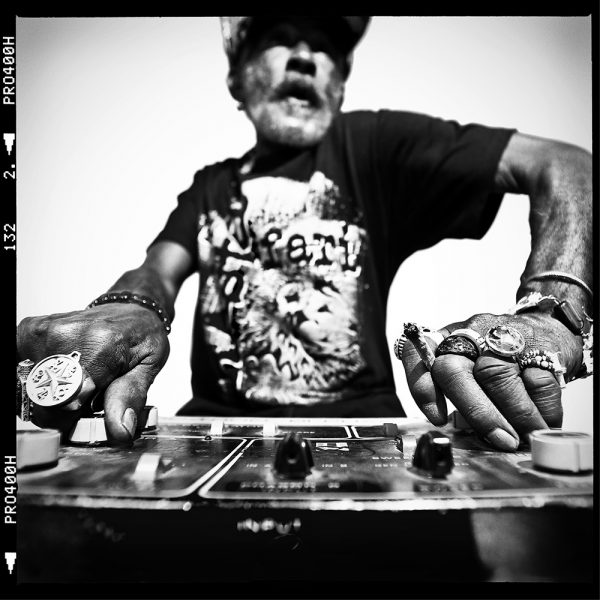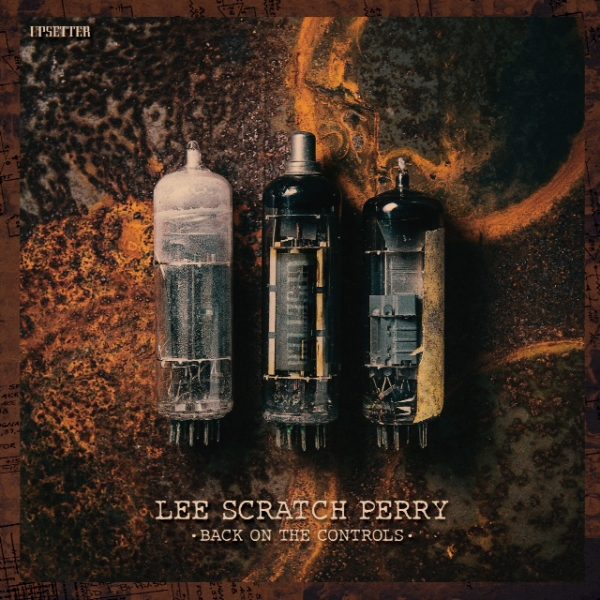Text by David Katz Photo by Nick Caro訳:高橋瑞穂
2014年10月にRiddimOnlineに掲載された記事です。
アップセッター・レコーズから発売中のLee Perryの最新作『Back On The Controls』について「People Funny Boy」の著者であるデビッド・カッツの原稿がロンドンから届いた。
リー“スクラッチ”ペリーの語る「あらかじめ定められた世界」は、私たちが生きている俗世とはまったく違う。あちらの世界では、その異端のジャマイカ人プロデューサーが便座に座って瞑想をしていると、見識と分別を持った精霊が現れて助言を与えたり、善と悪の力が引き起こす果てしない戦いを乗り切る手助けをしてくれる。前触れもなく、白い馬にまたがった雷神が勢いよく走りこんできて、避雷針を振りかざしながら英国の(保守党党首)デビッド・キャメロンと(自由民主党党首)ニック・クレッグの連立政権や米国のバラク・オバマ内閣を叱責したり、わがまま放題の銀行家に鞭を打って服従させたりする。78歳になったペリーは、苦い顔で、「本来、政府は1つしかない。だから今、新しい政府など1つもない」と言う。彼の新作『Back On The Controls』からのシングル第1弾となった「Rastafari On Wall Street」の着想はどこにあるかという私の質問に対して、彼はこう応じた。「ラスタファリはニューエルサレム(注1)とオールドヘヴン(注2)を支配する。サード・ワールドは終わる。だからラスタファリはウォール・ストリートを苦しめ、喜ばせ、屈服させる。ラスタファリは、紀元後から紀元前まで最初の政府は神政(注3)と名付けられていた事実を明らかにし、デモクラシー(民主主義)に脅威を与える。今、アメリカ人は神の名をコピーし、それをデモクラシーと呼ぼうとしている。しかし、デモ(注4)は完璧ではない。それはダブ(注5)ですらない。神政とは音楽だ。神政はメルキゼデク(注6)という名のハープを携えている」。
ペリーについてあまりよく知らない人のために説明すると、ペリーのスピリチュアルな意識の流れは、早口なパトワのせいもあって理解しにくいことがある。しかし、ひとたび内容が頭に入ってくれば、そこには英知が溢れているのがわかる。また、半世紀におよぶ型破りな音楽経歴の中で作り出した、話があっちこっちに飛びまくる宇宙論は、同じような天性を持つ人々とペリー自身を調和させるものだ。たとえば、フリージャズの作曲家で夢想家のサン・ラ。アフローフューチャリズム(注7)のファンク王、ジョージ・クリントン。ミニマリストの先駆けであり、作曲家であり、楽器発明家であり、風変わりな服装で「6番街のバイキング」と呼ばれていたルイス“ムーンドッグ”ハーディン。もちろん、ペリー自身も長年、普通ではない服装を好んでいる。最近の定番スタイルは、特注のベースボールキャップ、モザイク彫刻で埋め尽くされたアーミーブーツ、油絵具で赤くした髪とあごヒゲ。首にはタイタニック号を沈められるぐらいの大量のキラキラ光る宝飾品をぶら下げる。本人に直接会えば、1970年代後半にリントン・クウェシ・ジョンソンがペリーを「レゲエ界のサルバドール・ダリ」と呼んだ理由がわかるだろう。1970年代の後半。それはペリーのプロダクションの全盛期で、彼のブラックアーク・スタジオが、レゲエ史上最も魅力的で最も独特な楽曲群を量産していた時代だ。
1960年代初頭にはスカの確立に手を貸し、その数年後にはレゲエを産み出し、ボブ・マーリー&ザ・ウェイラーズを世界のスターダムに押し上げた後、ペリーは1973年にブラックアーク・スタジオを開設した。キングストン西部郊外の自宅の庭に建てた、小さなシェルターのようなスタジオは、ラスタファリの信望者とレコーディングに関わる人間にとっての天国だった。基本的な4トラックのマルチレコーダーしか備え付けられていなかったが、普通とは違うエフェクトの使い方から魔法のように生まれてくるサウンドが1つ1つの楽曲を並外れたものにする。そして、この世のものとは思えないほど美しいダブ・ヴァージョンの濃密な質感は、ペリーのカルト的人気を世界中で高めた。1976年に入ると、アイランド・レコーズがマックス・ロメオの『War In A Babylon』、ジュニア・マーヴィンの『Police And Thieves』といったペリーの作品をリリース。まもなく、ポール&リンダ・マッカートニー、ジョン・マーティン、ロバート・パーマー、セックス・ピストルズ、クラッシュら、ブラックアーク・スタジオが創り出すサウンドの魅力に惹きつけられた者たちが、ペリーの魔力を求めてやってくるようになる。ところが、1979年、全てが崩壊した。ジャマイカの政治が最も荒れ狂っていた当時、麻薬の濫用のために精神状態がますます不安定になっていたペリーを、克服できないような困難が襲う。その末に、彼はアークのドアを閉ざし、火を放った。
1980年代半ばにロンドンに流れ着いたペリーは、突飛な行動の産物のような作品を少しばかり作っている。その後、妻兼マネージャーとなるミレーユ・キャンベルと共にスイスに移住し、2人の子供をもうけると、ペリーが必要としていた心の平穏がようやくもたらされた。1998年にはビースティー・ボーイズの「Dr.Lee, PhD」(注8)にボーカリストとして参加。この作品を通じて、ペリーは新たなファンを獲得し、再び世界の脚光を浴びるようになった。
残念なことに、音楽市場では新しい(世紀に入ってからリリースされた)リー・ペリーのアルバムが飽和状態になっている。しかも、その多くは完成度が低い。音楽のプロではないが彼のファンだという人々がインターネットで簡単にペリーと接触し、レコーディング・プロジェクトを提案する。けれども、そのようにして制作される作品には質が伴わない。ペリーは世界中の音楽フェスでメインアクトを務めているが、新たにファンになった人々が、昨今の作品とは品質的に何万光年も離れたレベルにあるブラックアーク時代のクラシックなサウンドに耳を傾けるようになっている。ペリーの新作『Back On The Controls』は、ブラックアーク時代の制作方法をなぞり、ペリー自身がヴィンテージ物のエフェクター類を操作することで、最近の作品とブラックアーク時代の作品の間にある溝を埋めることを目指したアルバムだ。
新作の仕掛け人であるダニエル・ボイルは、次のように語る。「最初にリー・ペリーに連絡をしたとき、“ブラックアークの再現はしていないけれど、ブラックアークに大きな影響を受けている”と話した」「私が現在やっていることや、ペリーがブラックアークで使っていたのと同じミュートロンのバイ・フェーズやグランピアン社のスプリング・リバーブといった小道具(機材)を入手したことや、現代の機材と当時の機材の両方を駆使して、あの時代と今の時代を合わせた何か違うものを創りたい、というようなことをメールに書いた」「数年後、“今、ロンドンにいますが、会いますか?”という内容のメールがミレーユから届いて。それからペリーが私のスタジオに来て、“Repent”という曲のヴォイシングをして。その数週間後、ミレーユが“リーが本当にアルバムを作りたがっています”と電話をくれた」。ペリーの話が、ボイルの話を裏付ける。「ああいうことをしようというのはダニエル・ボイルのアイディアだ。彼は私が使っていた機材を知っていて、そのほとんどを用意していた。彼はいいアイディアを持っている。しかもクリーンな人間だ。だから一緒に曲を作り、それがうまくいった」。
ボイルはシティ(ロンドンの金融街)で昼間の仕事に長く就いていたが、当時から音楽が一番のやる気の源だったという。彼はノーフォークのスタジオでエンジニアの技術を学び、ロンドンに引っ越した後、サウンドシステム用のダブ・プレートをレコーディングし始めた。昨年はジャマイカでマックス・ロメオのレコーディングも敢行している。『Back On The Controls』は、ペリーがロンドン入りしたときにヴォイシングを少しずつ行うという方法で作られたため、完成までに3年を要した。そして、このじっくりと時間かける制作方法が、明らかに平均以上の成果をもたらしている。ペリーは意味のあるリリックスを生み出す時間を持つことができたうえ、ボイルのローリング・ライオン・スタジオでしっぽりと快適に過ごし、レコーディング中はボイルが住んでいるロンドン北部のアパートに寝泊まりしたという。
ミュージシャンは、ベースがヒューイ・イサッカー (注9)、ドラムはルーツ・ラディックスのスタイル・スコットとプリンス・ファッティー(注10)・クルーのホースマン。その顔触れを見ただけで、新譜のリディムが聴けば聴くほど味わい深いものだとわかる。極めつけは、このアルバムが全曲ダブ・ヴァージョン付きのショウケース・スタイルになっている点だ。ヴォーカル・トラックの後にもれなくダブがついてくるスタイルについて、ボイルは次のように説明する。「歌とダブのコンビネーションが好きで、それを1枚のアルバムでやってみたかった。通して聴くと1つの旅に出ている気分になるアルバムをね。歌とそのダブ・ヴァージョンを2つの別個のものとして作っていくと、ものすごい分化が起こる」
ブラックアーク以降のペリーの作品にはよくあることだが、新作で扱っているテーマは、悪に対する辛辣な批判を歌う「Pow Satan」や神政主義の布告である「Tug O War」から、楽しげにふざけ倒す「Do The Dubstep」まで、あっちこっちに転がる。それは、昨今のダンスミュージックシーンに広がっている“なんでもありの混ぜこぜ”技法に対するペリーなりのアプローチでもある。また、往年の名作を突然変異させた楽曲もある。なにしろ、「Blackboard Jungle Dub(注11)」の新バージョンである「Blackboard Re-vision」は、ユーカリ油の効能を称賛する内容だ。そして、たとえ「I Believe」でのペリーが痛ましいほどの音痴でも、俺は正気だと大声で叫んでいても、私は構わない。ありがたいことに、このアルバムには彼の最近の作品に散見されていた下ネタが全くないのだから。
「ダニエルは天啓の中にいると思う。彼のそばには常に、死を拒絶する精霊がいるからだ」とペリーは言う。そして「(このアルバムは)あらかじめ定められていたコラボレーションだ」と重ねて言う。「ダニエルはとてもうまくやっているようだ。彼のビジョンは必ずうまくいく。それがオリジナルなビジョンだからだ。ビジョンがなければ人は死ぬ。私にとって、このアルバムは100%完璧だ。でも、それをあなたに説明することはできない。将来、もっとすさまじくディープなのをやるつもりだからだ」。
『Back On The Controls』は現在、アップセッター・レコーズから発売中。
注1)旧約聖書エゼキエル書の中で、イスラエル12部族が集うメシア王国の首都となる場所でエルサレムに作られると予言された都市のこと
注2)旧約聖書での「heaven」は、神が王として地上を見下ろして支配する場所と記されているが、ペリーがどの意味で用いているかは不明
注3)神の意を心にとどめて守り、神の代理者である支配者によって行われる政治。神権政治
注4)デモ(demo)はデモクラシー(民主主義)と試作版(デモテープなどの)のダブルミーニングか
注5)ダブ(dub)は吹き替えやニックネームという意味のダブとダビングのダブルミーニングか
注6)旧約聖書に登場する人物で、「いと高き神の祭司」「エルサレムの王」として紹介されている
注7)アメリカ黒人のルーツはアフリカではなく宇宙であるとする考え方
注8)98年にリリースされたビースティー・ボーイズのアルバム『Hello Nasty』に収録
注9)70年代末からパブロ・ガッドやジャー・シャカのプロダクションで活躍するミュージシャン。元来はギタリストだが、ベースやメロディカの演奏にも定評があり、ヴォ―カリストとしても知られている。
注10)90年代のアシッドジャズからグレアム・コクソン、リリー・アレンにダブ・シンジケート、ホリー・クックまで幅広いジャンルの音楽を手掛けるプロデューサー兼エンジニアのマイク・ペランコニが率いるユニット。05年にファッションブランドの「ステューシー」のために制作した「Nina’s Dance」が大ヒットし、レゲエ以外の分野にも知られるようになった。
注11)1973年にリリースされたアップセッターズのアルバム『Blackboard Jungle Dub』に収録。
Text by David Katz
The pre-ordained universe of Lee “Scratch” Perry differs from our earthly present. It is a realm where spirits dispense wisdom, providing counsel as the maverick Jamaican producer meditates on his toilet seat, helping him to navigate the perpetual battles waged by the forces of good and evil. The Thunder God may appear without warning, striding into town on a white horse and brandishing a lightning rod to chastise the Cameron/Clegg coalition or the Obama cabinet, and whip wayward bankers into submission. “There’s only one government originally, so there’s no new government now,” the 78-year-old Perry says with a scowl, trying to explain the inspiration behind “Rastafari On Wall Street,” the debut single from his new album, Back On The Controls. “Rastafari is the controller of the New Jerusalem and the Old Heaven, and the Third World is finished, so that’s why Rastafari upset Wall Street and down-set Wall Street, to overthrow Wall Street. He threatened democracy to show that the first government was named theocracy, from AD to BC; now the Americans are trying to copy the name of God and call it democracy, but a demo is not perfect—it’s not even a dub. So theocracy is music, and theocracy has a harp named Melchezidek.”
For the uninitiated, Perry’s spiritual stream-of-consciousness can be hard to fathom, especially since he delivers it in rapid-fire patois, but there’s plenty of wisdom on offer once comprehension kicks in. The alternate cosmology he fashioned during an unorthodox musical career that has lasted half a century keeps him in harmony with a handful of kindred spirits, such as free-jazz visionary Sun Ra, Afro-futurist funkster George Clinton, and Louis “Moondog” Hardin, the minimalist found-sound pioneer whose outlandish garb earned him the nickname “The Viking of 6th Avenue.” Of course, Perry has long been fond of a non-standard wardrobe himself, his regular kit now featuring a customised baseball cap and army boots covered with mosaic sculpture, his hair and beard made red by oil paints, and enough kitch bling around his neck to sink the Titanic. Meeting the man in person makes it entirely clear why Linton Kwesi Johnson dubbed him “The Salvador Dali of Reggae,” during his production heyday of the late 1970s, when his Black Ark studio churned out some of the most striking and individual pieces of reggae ever committed to tape.
After helping to form ska in the early 1960s, giving birth to reggae a few years later, and preparing Bob Marley and the Wailers for international stardom, Perry opened the Black Ark in late 1973. This tiny, bunker-like annex, which adjoined his home in a suburb of western Kingston, was conceived as a haven for the Rastafari faithful as well as a recording facility. Although it only had a basic four-track tape machine, the sound he conjured there through the non-standard use of effects units made the studio’s output exceptional, the dense textures of his ethereal dub versions gaining Perry an international cult following. Island Records began issuing his product in 1976, yielding hit albums such as Max Romeo’s War In A Babylon and Junior Murvin’s Police And Thieves; soon Paul and Linda McCartney, John Martyn, Robert Palmer, the Sex Pistols and the Clash were seeking Perry’s services, all drawn by the lure of the Black Ark sound. But then, at the end of the decade, everything crashed: personal problems, exacerbated by substance misuse, brought insurmountable pressure during one of Jamaica’s most turbulent political phases, leading Perry to close the doors of the Ark, and eventually torch it. The mid-1980s found him washed up in London, his erratic behaviour yielding sparse material. Settling in Switzerland with Mireille Campbell, the wife/manager with which he later fathered two children, brought some badly-needed stability; Perry’s 1998 collaboration with the Beastie Boys ultimately brought a whole new legion of fans and a concerted return to the limelight.
Unfortunately, the market has since been heavily saturated with new Lee Perry albums, many of them decidedly half-baked. With ease of access afforded by the internet, non-professional fans got in touch to propose recording projects, many of which lacked quality control. As Perry became a regular headline act on festival stages around the world, most supporters hearkened after the classic sound of the Black Ark, which seemed a million miles away from recent works. Back On The Controls aims to redress the balance by drawing on the Black Ark blueprint, and by allowing the maestro to operate vintage effects units himself.
“When I first contacted Lee Perry, I said, I’m not replicating the Black Ark but I’m hugely influenced by it,” explains Daniel Boyle, the driving force behind Back On The Controls. “I constructed this email and said what I was doing, that I got the same model of Mutron bi-phase that was in his studio, and some other toys, like a Grampian spring reverb, using some modern equipment and some old equipment, combining what was then and what was now, to do something different. A couple of years later, I got an email from Mireille: We’re in London next week, do you want to meet? So he came to my studio and we voiced the song ‘Repent.’ A couple of weeks later, Mireille called up and said, Lee really wants to do an album.”
“It was his idea to do something like that, getting most of the instruments him knew me used to have,” confirms Perry. “Him have a good idea, and he was a clean person, so we put the songs together, make them work.”
Though Boyle had a longstanding day-job in the City, music has been his primary motivator. He cut his engineering teeth at a studio in Norfolk, began recording dub plates for sound systems after moving to London, and travelled to Jamaica last year to record Max Romeo. Back On The Controls took the better part of three years to complete, being voiced piecemeal, whenever Perry was in town. And this unhurried approach has certainly yielded better-than-average results, allowing Perry the space to deliver lyrics that actually mean something, and to become properly comfortable with Boyle’s Rolling Lion studio, housed in the spare room of his north London flat. The presence of bassist Hughie Isaachar, and drummers Style Scott of the Roots Radics and Horseman of Prince Fatty’s crew mean that the rhythms of Back On The Controls feel very meaty, and the album has been sequenced “showcase” style, so that every vocal track is followed directly by its corresponding dub version. As Boyle explains, “I went for the song/dub combination, as we really want it to be one album, and a journey as you listen. Doing it as two separates creates too much of a divide.”
As is typically the case with post-Ark Perry, the album’s subject matter veers all over the place, from the devil castigation of “Pow Satan” and the theocratic edict of “Tug O War” to the playfully nonsensical “Do The Dubstep,” which dissects Perry’s approach to the mixing techniques that inspired the current dance music form. There are also a few mutations of Perry classics, including a new version of “Blackboard Jungle Dub” that salutes the healing powers of eucalyptus oil. And even if Perry is woefully off-key on “I Believe,” on which he debates his own sanity, the album is thankfully free of the objectionable content that has blighted so many recent releases.
“I think Daniel is in the prophecy, as there is a spirit that always refuses to die,” says Perry, emphasising the predetermined nature of their collaboration. “It looks like Daniel is very successful; his visions always work, because they’re original visions, and without vision, the people would perish. To me, the album sound 100% perfect. But I could not explain it to you, cause me just go real deep in the future to do it.”
Back On The Controls is out now on Upsetter Records.



